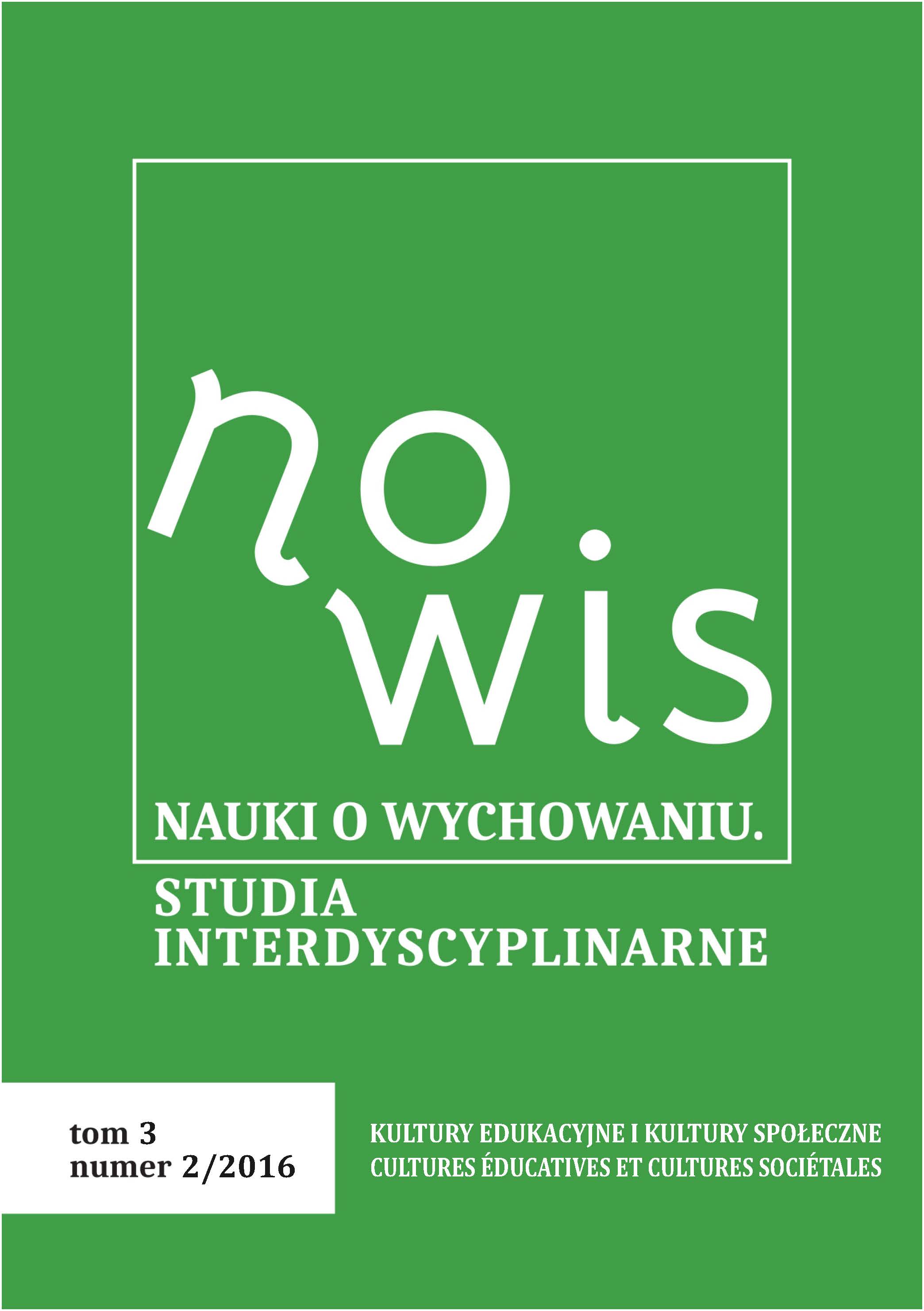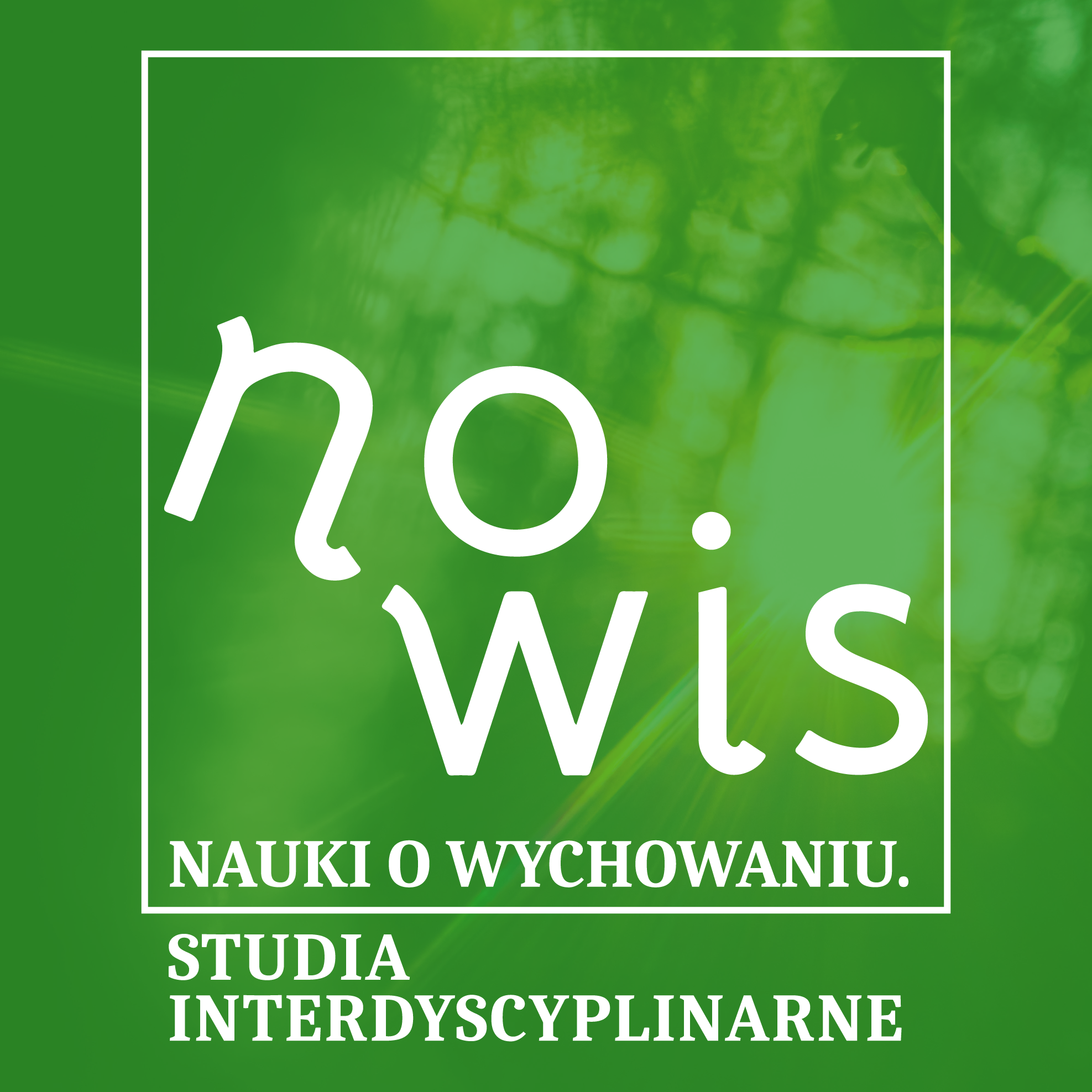Kultury działania i podzielane sposoby organizacji konstrukcji sensu
DOI :
https://doi.org/10.18778/2450-4491.03.02Mots-clés :
kultura, działanie, myślenie, sensRésumé
Przedmiotem konceptu kultury działania są ramy myślenia podmiotów i werbalizacji działania. Obserwuje się różnorodność kultur działania w różnych dziedzinach, takich jak: edukacja, praca socjalna, terapia, zarządzanie, aktywność naukowa. Koncept kultury działania może być zdefiniowany jako podzielany i ewoluujący sposób organizacji procesu konstruowania sensu wokół aktywności podmiotów, w które są zaangażowane. Jest on bliski pojęciu episteme w znaczeniu nadanym przez Foucaulta oraz przyzwyczajenia mentalnego (habitude mentale) Panofskiego.
Références
Anscombre J. C. (red.) (1995) Théorie des topoï, Paris, Kime.
View in Google Scholar
Barbier J. M. (2000a) La singularité des actions : quelques outils d’analyse w: J. M. Barbier, O. Galatanu (dir.), L’analyse de la singularité de l’action, Paris, Presses Universitaire de France : 13–51.
View in Google Scholar
Barbier J. M. (2000b) Sémantique de l’action et sémantique d’intelligibilité des actions w: Maggi B. Manières de penser, manières d’agir en éducation et formation, Paris, Presses Universitaire de France.
View in Google Scholar
Barbier J. M. (2006) Działanie w kształceniu i pracy socjalnej. Analiza podejść, tłum. G. Karbowska, Katowice, Wydawnictwo Naukowe „Śląsk”, Seria Biblioteka Pracownika Socjalnego.
View in Google Scholar
Barbier J. M. (2016) Leksykon analizy aktywności. Konceptualizacja zwyczajowych pojęć, przekł. oprac. E. Marynowicz-Hetka, Łódź, Wydawnictwo Uniwersytetu Łódzkiego.
View in Google Scholar
Barnes B. ([1990] 1998), Thomas Kuhn, w: Powrót wielkiej teorii, Q. Skinner (red.), przekł. T. Łozowski, Lublin, Wydawnictwo Uniwersytetu Marii Curie-Skłodowskiej, s. 99–118.
View in Google Scholar
Berthoz A. (1997) Le sens du mouvement, Paris, O. Jacob.
View in Google Scholar
Boas F. (1898) Introduction to: James Teit, Traditions of the Thomson River Indians of British Columbia, „Memoirs of the American Folklore Society”, vol. 6.
View in Google Scholar
Bourdieu P. (1967) Postface à : Panofsky E. Architecture gothique et pensée scolastique Paris, Minuit : 135–167.
View in Google Scholar
Bruner J. (1996) L’éducation, entrée dans la culture. les problèmes de l’école à la lumière de la psychologie culturelle, Paris, Retz.
View in Google Scholar
Bruner J. (2006) Kultura edukacji, tłum. T. Brzostowska-Tereszkiewicz, Kraków, Universitas.
View in Google Scholar
Cefaï D. (1994) Type, typicalité, typification. La perspective phénoménologique w: B. Fradin, L. Quere, J. Widmer, L’enquête sur les catégories. raisons pratiques, 5 Paris, Ehess : 105–128.
View in Google Scholar
Certeau M. de ([1990] 2004) L’invention du quotidien. Ľart de faire, Paris, Flammarion.
View in Google Scholar
Certeau M. de (2008), Wynaleźć codzienność. Sztuki działania, tłum. K. Thiel-Jańczuk, Kraków, Wydawnictwo Uniwersytetu Jagiellońskiego.
View in Google Scholar
Cru D. (1986) Collectif et travail de métier; sur la notion de collectif de travail, in plaisir et souffrance au travail, (sous la dir.) de C. Dejours, Paris, Edition de L’AOCIP/CNRS, 1988–1993, t. 1 : 40–46.
View in Google Scholar
Coster de M., Pichault F. (red.) (1998 2ème) Traité de sociologie du travail, Préface d’A. Touraine, Louvain-la-Neuve, de Boeck Université.
View in Google Scholar
Cuche D. ([1996] 1998) La notion de culture dans les sciences sociales, Paris, La découverte.
View in Google Scholar
Dewey J. ([1938] 1993) La théorie de l’enquête, Paris, Presses Universitaire de France.
View in Google Scholar
Duchamp M. (1975) Duchamp du signe, Paris, Flammarion.
View in Google Scholar
Ducrot O. (1989) Zarys polifonicznej teorii wypowiadania się, tłum. A. Dutka, „Pamiętnik Literacki”, LXXX, z. 3, s. 257–303, bazhum.muzhp,pl [dostęp: 14.11.2016].
View in Google Scholar
Durand M. (2006) Apprentissage et configuration d’activité : une dynamique ouverte des rapports sujets-environnements w: J. M. Barbier, M. Durand, Sujets/activités/environnements – approches transverses, Paris, Presses Universitaire de France : 61–84.
View in Google Scholar
Foucault M. ([1966] 2004) Les mots et les choses, Paris, Gallimard.
View in Google Scholar
Foucault M. (1968) Dits et écrits, t. 1, Paris, Gallimard.
View in Google Scholar
Foucault M. ([1969] 2004) L’archéologie du savoir, Paris, Gallimard.
View in Google Scholar
Foucault M. (1971) L’ordre du discours, Paris, Gallimard.
View in Google Scholar
Foucault M. (1977) Archeologia wiedzy, tłum. Andrzej Siemek, Warszawa, PIW.
View in Google Scholar
Foucault M. (2002) Porządek dyskursu. Wykład inauguracyjny w Collège de France, 2 grudnia 1970, tłum. M. Kozłowski, Gdańsk, Wydawnictwo Słowo/obraz terytoria.
View in Google Scholar
Foucault M. (2006) Słowa i rzeczy. Archeologia nauk humanistycznych, tłum. T. Komendant, Gdańsk, Wydawnictwo Słowo/obraz terytoria.
View in Google Scholar
Galatanu O. (1999) Le phénomène sémantico-discursif de déconstruction-reconstruction des topoï dans une sémantique argumentative intégrée, „Langue Française”, nr 123, sept. Larousse.
View in Google Scholar
Goffman E. (1974/1991) Les cadres de l’expérience, Paris, Minuit.
View in Google Scholar
Goffman E. (2008) Analiza ramowa. Esej z organizacji doświadczenia, tłum. S. Burdziej, wstęp M. Czyżewski, Kraków, Zakład Wydawniczy „NOMOS”.
View in Google Scholar
Herskovits M. J. ([1948] 1952) Les bases de l’anthropologie culturelle, Paris, Payot.
View in Google Scholar
Hofstadter D. ([1979] 1987) Gödel, Escher, Bach : les brins d’une guirlande éternelle, Paris, Intereditions.
View in Google Scholar
Jullien F. ([1992] 2003) La propension des choses. Pour une histoire de l’efficacité en chine, Paris, Seuil.
View in Google Scholar
Jullien F. ([2000] 2005) Le Nu impossible, Paris, Seuil.
View in Google Scholar
Jullien F. (2006) Drogą okrężną i wprost do celu. Strategie sensu w Chinach i Grecji, tłum. M. Falski, Kraków, Wydawnictwo Uniwersytetu Jagiellońskiego.
View in Google Scholar
Kuhn T. ([1962] 1991) La structure des révolutions scientifiques, Paris, Flammarion.
View in Google Scholar
Lévi-Strauss C. (1962) La pensée sauvage, Paris, Plon.
View in Google Scholar
Lévi-Strauss C. (1969) Myśl nieoswojona, tłum. A. Zajączkowski, Warszawa, PWN, Seria Biblioteka Socjologiczna.
View in Google Scholar
Lévi-Strauss C. (1970) Antropologia strukturalna, tłum. K. Pomian, Warszawa, PIW.
View in Google Scholar
Levy-Bruhl L. (1910) Les fonctions mentales dans les sociétés inférieures, Paris, Presses Universitaire de France.
View in Google Scholar
Levy-Bruhl L. ([1918] 1992) Czynności umysłowe w społeczeństwach pierwotnych, tłum. B. Szwarcmann-Czarnota, Warszawa, PWN, Biblioteka Klasyków Psychologii.
View in Google Scholar
Levy-Bruhl L. ([1922] 1960) La mentalité primitive, Paris, Alcan.
View in Google Scholar
Linton R. (1988) Le fondement culturel de la personnalité, Paris, Dunod.
View in Google Scholar
Linton R. (2000), Kulturowe podstawy osobowości, tłum. A. Jasińska-Kania, Warszawa, Wydawnictwo Naukowe PWN, http://www.khg.uni.wroc.pl/files/9_khg_13_pilarska_t.pdf [dostęp: 1.09.2016].
View in Google Scholar
Malinowsky B. ([1944] 1970) Une théorie scientifique de la culture, Paris, François Maspero.
View in Google Scholar
Malinowski B. ([1944] 1958) Naukowa teoria kultury, tłum. H. Buczyńska w: B. Malinowski, Szkice z teorii kultury, Warszawa, Książka i Wiedza, s. 3–111.
View in Google Scholar
Moles A. (1967) Sociodynamique de la culture, Paris, Mouton.
View in Google Scholar
Moles A. (1978) Kicz, czyli sztuka szczęścia. Studium o psychologii kiczu, tłum. A. Szczepańska, A. Wende, Warszawa, PIW.
View in Google Scholar
Morin E. (2001) Le monde comme notion sociologique in. D. Mercure (dir.), Une société-monde? Les dynamiques sociales de la mondialisation, Presses de l’Université Laval, De Boeck.
View in Google Scholar
Panofsky E. ([1951] 1967) Architecture gothique et pensée scolastique, Paris, Minuit.
View in Google Scholar
Polin R. (1977) La création des valeurs, Paris, Vrin, 3ème édition, manuscrit 1943.
View in Google Scholar
Prigogine I. ([1993] 1997) Les lois du chaos, Paris, Flammarion.
View in Google Scholar
Prigogine I., Stengers I. (1990) Z chaosu ku porządkowi. Nowy dialog człowieka z przyrodą, tłum. K. Lipszyc, PIW, Biblioteka Myśli Wspołczesnej.
View in Google Scholar
Quere L. (1990) Agir dans l’espace public raisons pratiques. Les formes de l’action, Paris, Editions de l’ ehess.
View in Google Scholar
Rosch E. A. (1999) Reclaiming concepts, „Journal of Consciouness Studies”, 6 (11–12), s. 61–77.
View in Google Scholar
Schütz A. ([1932] 1974) Der sinnhafte aufbau der sozialen welt, Francfurt am Main, Suhrkamp ‘Taschenbuch Wissenschaft’.
View in Google Scholar
Schütz A. (2008) O wielości światów. Szkice z socjologii fenomenologicznej, tłum. B. Jabłońska, A. Manterys (red. nauk.), Kraków, Zakład Wydawniczy „NOMOS”.
View in Google Scholar
Stengers I. ([1993] 1995) L’invention des sciences modernes, Paris, Flammarion.
View in Google Scholar
Szacki J. (2002) Historia myśli socjologicznej. Wydanie nowe, Warszawa, Wydawnictwo Naukowe PWN.
View in Google Scholar
Theureau J. (1992) Le cours d’action, Berne, Peter Lang.
View in Google Scholar
Thevenet M. (1983) L’audit de la culture d’entreprise, Paris, Editions d’organisation.
View in Google Scholar
Tylor E. B. (1871) Primitive culture, London, J. Murray.
View in Google Scholar
Weber M. ([1904–1905] 1964) L’éthique protestante et l’esprit du capitalisme, Paris, Plon.
View in Google Scholar
Wittgenstein L. (1922/2001) Tractatus logico-philosophicus, Paris, Gallimard.
View in Google Scholar
Wittgenstein L. (2000), Tractatus logico-philosophicus (Traktat logiczno-filozoficzny), tłum. i wstęp B. Wolniewicz, Warszawa, Wydawnictwo Naukowe PWN, Biblioteka Klasyków Filozofii.
View in Google Scholar
Zeitler A. (2011) Les apprentissages interprétatifs, Paris, l’Harmattan, Action et Savoir.
View in Google Scholar
Téléchargements
Publiée
Comment citer
Numéro
Rubrique
Licence
© © Copyright by WNoW, Uniwersytet Łódzki, Łódź 2016 2016

Ce travail est disponible sous licence Creative Commons Attribution - Pas d'Utilisation Commerciale - Pas de Modification 4.0 International.





 Le site web de la revue, hébergé par l'équipe éditoriale de NOWIS se trouve sur la plate-forme Index Copernicus:
Le site web de la revue, hébergé par l'équipe éditoriale de NOWIS se trouve sur la plate-forme Index Copernicus: 





